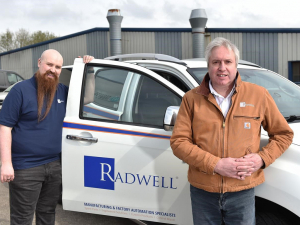‘Enginuity’ training hub to improve engineering skills in the South West
29th November 2007
Source:
Barden Corporation (UK) Ltd

With help from the Learning & Skills Council, more than 20 manufacturing companies from the Plymouth area are now working closely together and in conjunction with local schools, colleges, universities and business support organisations, as part of a new initiative to improve local training provision in the area, while also improving the image of manufacturing to attract more youngsters into the profession.
“Like the rest of the UK, companies in the Plymouth area have suffered from a lack of youngsters wanting to move into manufacturing after leaving school or college. In the past, manufacturing firms in Plymouth have not communicated to the youngsters what engineering as a career is all about and the possibilities,” says Dr Graham S. Stirling CBE, Managing Director of Plymouth-based bearings manufacturer The Barden Corporation (UK) Ltd.
“It was clear that we needed to work more closely with primary and early secondary schools in the area, as well as further and higher education establishments. We also recognised that training provision had to be demand-led. In other words, what skills, as manufacturing employers in the area, did we require? Rather than local colleges and universities coming to us with what they had to offer, we had to take the lead. This was quite a challenge, but we’re already seeing the benefits,” enthuses Stirling.
Stirling is adamant that Plymouth’s local problem is also a widespread, national issue. As he suggests: “There are great opportunities for youngsters going into manufacturing in this country. Not all manufacturing is going overseas to lower labour cost countries. Some of us are doing pretty well you know. Plymouth, like the rest of the UK, has world leading companies thriving on innovation, knowledge and lean manufacturing processes. The national media doesn’t help here, because it seems like only the negative stories about UK manufacturing actually make it to the news pages. There are still lots of positive stories to be told about British manufacturing.”
Stirling has a point. And Plymouth’s new ‘Enginuity’ initiative is certainly one of the positive stories.
Stirling is Chairman of the Plymouth Engineering Skills Council, a partnership between engineering employers, schools, colleges, universities and business support organisations, dedicated to securing the future skills requirements to enable manufacturing companies in the area to compete in the global marketplace. The ‘Enginuity’ programme was set up around 12 months ago to solve the skills shortage and training problems and is funded by the Government’s Learning & Skills Council and by the member companies themselves. As Managing Director of Barden, Stirling saw an opportunity not only to improve the training and skills of his own workforce, but also to help other manufacturers in the region.
As he explains: “The idea behind Enginuity can be applied to the rest of the UK, because the issues are similar everywhere you go. In Plymouth, we needed to bring together the educational establishments, the local media, the training providers and the employers, to work closer together – joined up thinking and communication if you like.”
The Enginuity programme started out by commissioning some high level research, to find out what training the major manufacturing companies in the region actually required; what challenges and issues they had with skills and education in the area; and to canvass their opinions on how to improve the image of manufacturing to youngsters in the local schools and colleges. The research was comprehensive, with 75% of all manufacturing firms in the region being interviewed.
More research followed, in the form of deeper questioning to a short list of companies. This involved detailed questions on human resources, skills and training requirements of each company. “We discovered that more training was needed, certainly, but we also had to help companies identify what training and skills they actually needed and the potential benefits of this to their businesses,” explains Stirling.
All the research was compiled and presented to local colleges, universities and employers. “What resulted from this was much more joined up communication between us all – the employers, the schools, the universities, colleges and training providers. Suddenly, educational establishments in the area started recognising what we, as employers, wanted in the way of training. For example, local colleges have now started to offer us training courses at our premises, at 6pm in the evening, if we need them. It means that employers can pay for training courses that don’t necessarily hinder their production process. After all, we all know how expensive it can be to take staff out of their day jobs to train them, so you need the very best provision at a time that suits your business. This is just one of the benefits we are already seeing from the Enginuity programme.”
Another key benefit has been that local colleges and universities are now, when required, bringing in the relevant training expertise from outside training providers, such as the Engineering Employers Federation (EEF). Rather than try to develop their own material for specific training programmes for employers, colleges and universities are now subcontracting the services from the experts, which is something Stirling sees as a key ingredient for Enginuity to succeed.
“At Barden, we’re already benefiting from Enginuity,” says Stirling. “We recently needed four more Six Sigma practitioners for the plant. We asked the other local employers if they required this sort of training too. 14 people required training, so Barden hosted the training session, which was conducted by representatives from The South West Manufacturing Advisory Service [SWMAS]. By aggregating our training needs, we were able to afford the best training provision for our staff. We’ve held similar training courses since then, and the places are filled very quickly.”
It’s not just training of existing staff that is top of Enginuity’s agenda. Attracting youngsters into the profession is a key objective too. “We’ve had to work closely with Editors from the local press, to provide them with positive stories about what our local manufacturing companies are doing inside their plants. We have also set in place a series of schools engineering challenges to show young students what modern day engineering is all about. The first challenge was run last November as part of National Enterprise Week and involved young students constructing wind turbines and the electricity generated from these turbines was subsequently measured. The second challenge required the students to construct a model submarine and subsequently navigate around a series of obstacles. Further challenges are planned for 2007.”
As Stirling suggests: “Too many youngsters think engineering is a decaying industry, with dark, grimy workplaces and oily machines. We’ve got to celebrate the success stories like they do in Germany and other countries, where a career in engineering is revered.”
According to Stirling, lack of money is not the issue: “Manufacturing companies that are succeeding in this country have embraced lean manufacturing as a concept, using techniques such as Six Sigma, 5S, Kaizen, to help drive out costs and improve quality, with zero defects and a niche product at the end of it all. Manufacturing is not going to die, it will continue for a long time in this country but companies must embrace these concepts. And training is also key to this.”
“It was clear that we needed to work more closely with primary and early secondary schools in the area, as well as further and higher education establishments. We also recognised that training provision had to be demand-led. In other words, what skills, as manufacturing employers in the area, did we require? Rather than local colleges and universities coming to us with what they had to offer, we had to take the lead. This was quite a challenge, but we’re already seeing the benefits,” enthuses Stirling.
Stirling is adamant that Plymouth’s local problem is also a widespread, national issue. As he suggests: “There are great opportunities for youngsters going into manufacturing in this country. Not all manufacturing is going overseas to lower labour cost countries. Some of us are doing pretty well you know. Plymouth, like the rest of the UK, has world leading companies thriving on innovation, knowledge and lean manufacturing processes. The national media doesn’t help here, because it seems like only the negative stories about UK manufacturing actually make it to the news pages. There are still lots of positive stories to be told about British manufacturing.”
Stirling has a point. And Plymouth’s new ‘Enginuity’ initiative is certainly one of the positive stories.
Stirling is Chairman of the Plymouth Engineering Skills Council, a partnership between engineering employers, schools, colleges, universities and business support organisations, dedicated to securing the future skills requirements to enable manufacturing companies in the area to compete in the global marketplace. The ‘Enginuity’ programme was set up around 12 months ago to solve the skills shortage and training problems and is funded by the Government’s Learning & Skills Council and by the member companies themselves. As Managing Director of Barden, Stirling saw an opportunity not only to improve the training and skills of his own workforce, but also to help other manufacturers in the region.
As he explains: “The idea behind Enginuity can be applied to the rest of the UK, because the issues are similar everywhere you go. In Plymouth, we needed to bring together the educational establishments, the local media, the training providers and the employers, to work closer together – joined up thinking and communication if you like.”
The Enginuity programme started out by commissioning some high level research, to find out what training the major manufacturing companies in the region actually required; what challenges and issues they had with skills and education in the area; and to canvass their opinions on how to improve the image of manufacturing to youngsters in the local schools and colleges. The research was comprehensive, with 75% of all manufacturing firms in the region being interviewed.
More research followed, in the form of deeper questioning to a short list of companies. This involved detailed questions on human resources, skills and training requirements of each company. “We discovered that more training was needed, certainly, but we also had to help companies identify what training and skills they actually needed and the potential benefits of this to their businesses,” explains Stirling.
All the research was compiled and presented to local colleges, universities and employers. “What resulted from this was much more joined up communication between us all – the employers, the schools, the universities, colleges and training providers. Suddenly, educational establishments in the area started recognising what we, as employers, wanted in the way of training. For example, local colleges have now started to offer us training courses at our premises, at 6pm in the evening, if we need them. It means that employers can pay for training courses that don’t necessarily hinder their production process. After all, we all know how expensive it can be to take staff out of their day jobs to train them, so you need the very best provision at a time that suits your business. This is just one of the benefits we are already seeing from the Enginuity programme.”
Another key benefit has been that local colleges and universities are now, when required, bringing in the relevant training expertise from outside training providers, such as the Engineering Employers Federation (EEF). Rather than try to develop their own material for specific training programmes for employers, colleges and universities are now subcontracting the services from the experts, which is something Stirling sees as a key ingredient for Enginuity to succeed.
“At Barden, we’re already benefiting from Enginuity,” says Stirling. “We recently needed four more Six Sigma practitioners for the plant. We asked the other local employers if they required this sort of training too. 14 people required training, so Barden hosted the training session, which was conducted by representatives from The South West Manufacturing Advisory Service [SWMAS]. By aggregating our training needs, we were able to afford the best training provision for our staff. We’ve held similar training courses since then, and the places are filled very quickly.”
It’s not just training of existing staff that is top of Enginuity’s agenda. Attracting youngsters into the profession is a key objective too. “We’ve had to work closely with Editors from the local press, to provide them with positive stories about what our local manufacturing companies are doing inside their plants. We have also set in place a series of schools engineering challenges to show young students what modern day engineering is all about. The first challenge was run last November as part of National Enterprise Week and involved young students constructing wind turbines and the electricity generated from these turbines was subsequently measured. The second challenge required the students to construct a model submarine and subsequently navigate around a series of obstacles. Further challenges are planned for 2007.”
As Stirling suggests: “Too many youngsters think engineering is a decaying industry, with dark, grimy workplaces and oily machines. We’ve got to celebrate the success stories like they do in Germany and other countries, where a career in engineering is revered.”
According to Stirling, lack of money is not the issue: “Manufacturing companies that are succeeding in this country have embraced lean manufacturing as a concept, using techniques such as Six Sigma, 5S, Kaizen, to help drive out costs and improve quality, with zero defects and a niche product at the end of it all. Manufacturing is not going to die, it will continue for a long time in this country but companies must embrace these concepts. And training is also key to this.”
Similar articles
More from Barden Corporation (UK) Ltd
- Super precision bearings guarantee accuracy and flexibility of surgical and robot articulated arms 28th May 2009
- The Problem of Obsolete Bearings 6th February 2009
- New website for super precision bearings 13th August 2008
- Emergency bearings for magnetic bearing systems 16th July 2008












Write a comment
No comments